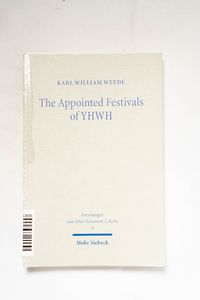
The asppointed festivals of YHWH : the festival calandar in Leviticus 23 and the sukkôt festival in other biblical texts / Karl William Weyde
Netto: 31.78 €34€
inkl. MwSt. zzgl. Versand
Bearbeitungszeit: 3 Werktage
Sofort lieferbar (auf Lager)
1x Stück verfügbar
Artikelzustand Mangelware (nachgebunden):
- Stark gebrauchter Zustand / Mangelware
- Buchrücken fehlt und wurde maschinell nachgebunden
- Seiten können fehlen, weil die Prüfung aller Seiten zu zeitaufwendig ist
- Coverseiten können vom Text abgeschnitten sein
- Vereinzelte Seiten können lose sein
- Blattübergänge können Unterschiede aufweisen
- Es handelt sich um Jahrzehnte alte Bücher, die nicht für Allergiker oder anspruchsvolle Kunden geeignet sind
Buchzusammenfassung:
In the first part of the book, Karl William Weyde analyses the festival calendar in Leviticus 23 and compares it with other festival calendars in the Hebrew Bible. On this basis, characteristic features of the Leviticus calendar appear, leading to the conclusion that Leviticus 23 presents the latest of the calendars and presupposes them. This holds good also vis-à-vis the priestly legal material in Numbers 28-29. Thus, the legislation for Passover and the festival of unleavened bread in Lev 23:5-8 is short because it builds on the detailed stipulations related in Exodus 12-13 and Deuteronomy 16. But it is also demonstrated that, for the sake of precision, the legislation for the grain festival in Leviticus 23 is more detailed than in other texts. Moreover, it is shown that the sukkôt festival is predominant in this calendar, together with other festivals in the seventh month. Without denying the possibility that the legislation was revised during the process of transmission, the author contends that some of the arguments used by recent researchers for such contention are not tenable. However, the Sabbath command (v. 3) and the sukkôt legislation in vv. 39ff are later additions inserted during the exile in Babylon. The second part of the book deals with texts related to the sukkôt festival in the Hebrew Bible. It gives examples of the significance of this festival in exilic and post-exilic times. Particular attention is paid to the question of whether it is possible to identify sukkôt psalms in the Psalter.





